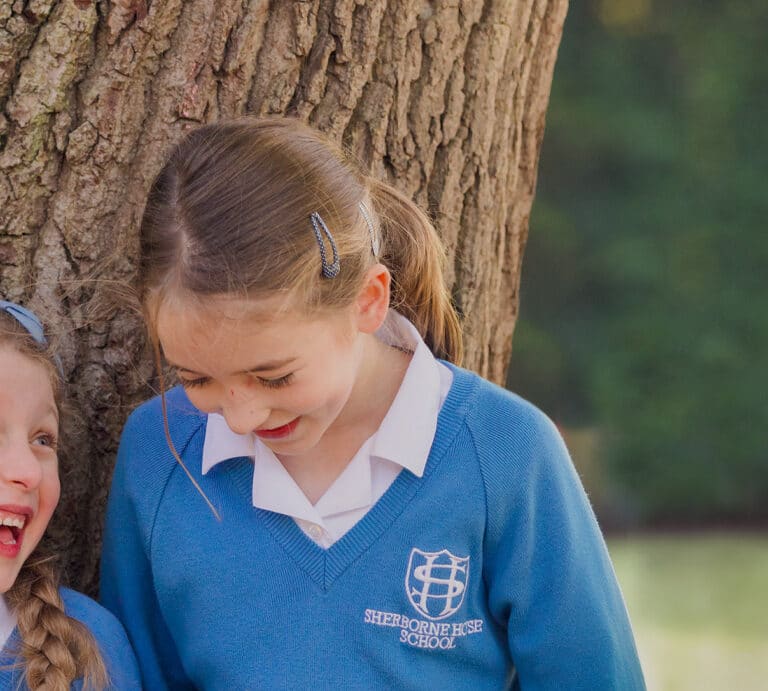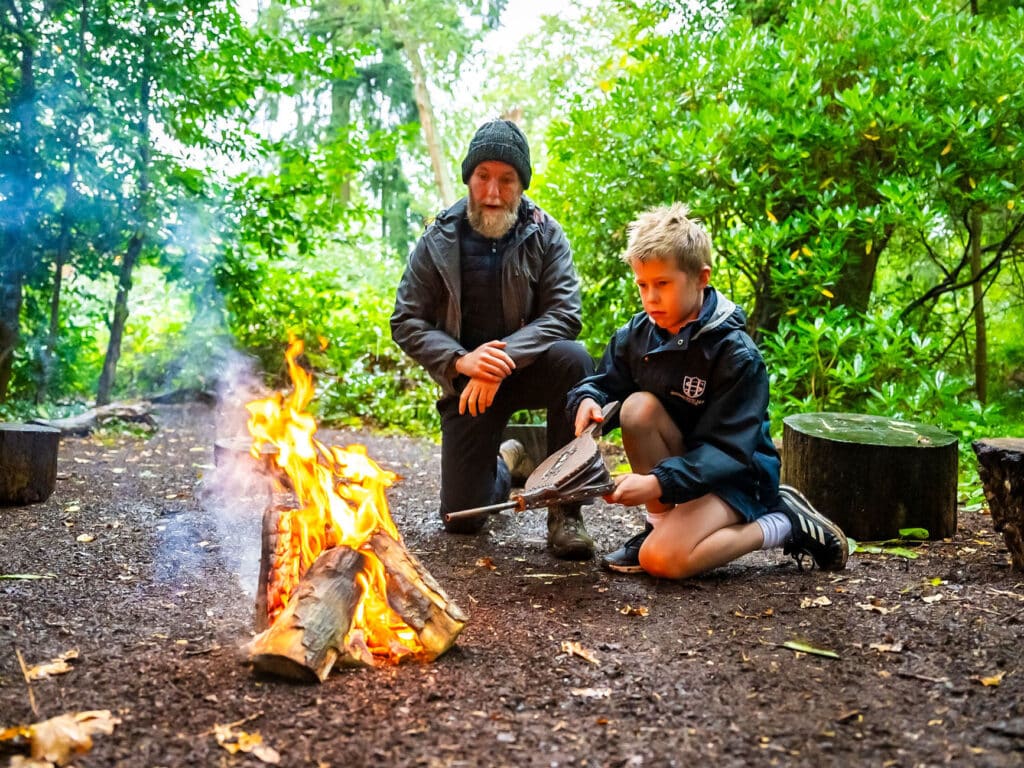It is time to shine the light on our Forest School expert, Liam Spillane, fondly known as Mr S. Since Mr S joined us in August, he has used every opportunity and spare minute to bring our Forest School woodland area to life!
Used every week, the area sees after school enrichment sessions for two groups, and is often used by other members of staff to link to other areas of the curriculum. As well as this, the area is regularly visited by many woodland creatures – they clearly appreciate the work that Mr S has done!
I am fortunate enough to join Mr S and Year 1 for their Wednesday Forest School session, where I have witnessed a wide range of skills in action – speaking and listening, creativity, collaboration, resilience, bravery… to name but a few! Quite simply, it has been a joy to experience and we cannot wait to see the future developments, as well as all that Forest School has to offer. This week, I had a chat with Mr S to find out more.
What is Forest School?
Forest School is a long term process; it is about being outdoors and fostering autonomy amongst the children. At Sherborne House, it is currently delivered as a series of introductory sessions via our after school enrichment offer. In moving this to a long-lasting and broader model, Forest School will be embedded into our curriculum for all year groups and children will experience the sessions throughout the academic year. These will be underpinned by the six principles and ethos of Forest School.
The Forest School Association describes Forest School as: ‘a child-centered inspirational learning process, that offers opportunities for holistic growth through regular sessions. It is a long-term program that supports play, exploration and supported risk taking. It develops confidence and self-esteem through learner inspired, hands-on experiences in a natural setting. Forest School has a developmental ethos shared by thousands of trained practitioners around the world, who are constantly developing their learning styles and skills to support new and imaginative learners.’
Why did you become a Forest School Leader?
Initially, I came to England on a work placement from Ireland, when studying Early Years at University. I settled in Fareham, securing a work-based placement, which involved support of Forest School provision at a local nursery. Slowly but surely, I found myself working increasingly within behaviour, and further away from Early Years provision. Joining Hampshire’s Primary Behaviour Service, I led a Lego therapy intervention at The Lennox Centre, which is where I dreamed up my first Forest School intervention. Over time, I have supported other schools to broaden their Forest School provision, ensuring that it is delivered to all age groups.
As for ‘why’, Forest School presents all children with success in areas that do not rely on academic attainment within the classroom. It is an exciting form of learning because it is a hands-on, practical experience. Also, given the increase in sedentary lifestyles these days, many children do not often have the opportunity to be out and about in the wild. This offers another platform to present the physical benefits of being outdoors.
My childhood was characterised by free exploration. My experience of youth was free and outdoors – I was granted time to roam and explore whereas, nowadays, this privilege has become more limited for children. I would like to give this back.
Do you have any particular interests or skills that show through in your Forest School provision?
I am passionate about history and all things construction. I love green woodworking and, if I could live somewhere in a deep forest in Scotland, I would! As for my skills: whittling, music (with a Diploma in Classical Guitar) and Bushcraft are some that will certainly come to use during Forest School.
What sort of groups have you run before?
I have delivered direct teaching through Bushcraft, which is a more rigorous approach, including tool usage. This has presented children with a survival element and opportunities to focus on the flora and fauna of an area. My experience of enhancing Forest School provision in various settings has been driven by my aim to promote autonomy and child-led learning within all of the groups I’ve delivered.
How do you balance child-led and adult-directed activities?
It is about modelling the skills before allowing the children to take ownership. In my practice, you might come and find me working on a particular task for the children to see. I will show a plethora of skills and tasks before the children are able to make the process their own. It is about providing options to make the sessions exciting and novel.
Overall, Forest School enables the children to engage their bodies differently; after all, it is a different type of learning environment to the classroom. The children are shown the process of risk assessing; by being at Forest School, children are supported to safely identify and experiment with risks.
In the current after school clubs, I facilitate and scaffold the development of children’s skill in the following areas: fire-starting and safety, negotiating risks, whittling, use of tools and materials, mud-making (wattle and daub), classifying of items, as well as building techniques.
I also facilitate learning about the natural environment: the creatures in the area and what happens underneath the ground. This adult-directed learning precedes the child-led building of wormeries, hunting of mini bugs, and mud-painting. Further, I have spoken with the children about the thought that needs to go into clearing an area of woodland, particularly in order to make way for other flora and fauna to flourish. For example, at Sherborne House, I have been removing much of the rhododendron as, if left uncontrolled, rhododendron will eventually dominate the habitat to the virtual exclusion of all other plant life. This has resulted in teaching the children about woodland management and the importance of being custodians of their Forest School area.
Myth Busting! ‘Forest School is the same as outdoor learning.’
It is not. Outdoor learning has a very adult-directed focus on it with a specific learning objective. It is tied to the curriculum. Forest School is an open invite to explore the environment and to become their own learner with focus on creativity, collaboration, resilience, and discovery.
What are your aspirations for Forest School at Sherborne House?
I would like our Forest School to encourage our children to go home and not stop talking about it. Infectious, catchy enthusiasm and excitement about learning in the forest. Learning which ensures that they cannot wait to come back again.
To find out more about what our Forest School has to offer, as well as its future plans, come to our next Open Day on Tuesday 21st November. Complete this form to register your attendance.



